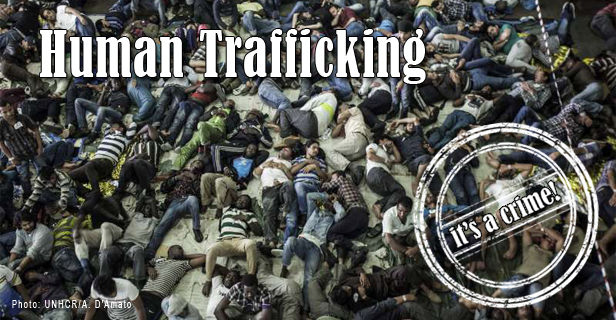

"Human trafficking is one of the world's most shameful ills-a heartless violation of human rights in which lives are traded, sold, exploited, abused and ruined. No country is immune, and millions of lives are at stake. We must take a united stand, shine a spotlight on the issue, put traffickers behind bars and give protection and support to victims and vulnerable people." - Secretary-General Ban Ki-moon
The trafficking of human beings has existed for centuries. It is a ruthless crime which mercilessly exploits millions of vulnerable women, children and men worldwide. Even today it is very difficult to assess the scale of the problem because of its clandestine nature. Almost every country in the world is affected either as a country of origin, transit, or destination. It has become a global criminal enterprise generating enormous illicit profits, worth billions of dollars per year. This global crime moves where the profits are higher and detection risks lower and which constantly mutates and evolves, adapting to local circumstances and opportunities.
Human trafficking is defined as "the recruitment, transport, transfer, harbouring or receipt of a person by such means as threat or use of force or other forms of coercion, of abduction, of fraud or deception for the purpose of exploitation ". (Trafficking in Persons Protocol)
Trafficking can occur nationally or regionally, or from continent to continent. No country is left untouched by human trafficking: Europe is a destination for victims from the widest range of destinations; many people from Asia are trafficked to the widest range of destinations, and the Americas are prominent, both as the origin and destination of victims of human trafficking. Trafficking within the same region seems to be the most common trafficking flow.
People are trafficked to be exploited in a range of different sectors: of the detected victims in 2011, 53 per cent were involved in sexual exploitation and 40 per cent in forced labour which includes exploitation in agriculture, horticulture, construction, textile production in sweatshop conditions, catering and restaurants, entertainment services and domestic servitude. Other forms of exploitation have been found such as forced marriage, organ removal, illegal adoption and the exploitation of children for begging and as child soldiers.
Most countries have now criminalized trafficking with a specific offence in line with the UN Trafficking in Persons Protocol. But impunity remains a serious problem; only four in 10 countries reported having 10 or more yearly convictions in 2010-2012 and nearly 15 per cent having no convictions at all in the same period.

Poverty and inequality are linked to increases in organized crime including human trafficking. Targets aimed at reducing the number of people being trafficked are being discussed by the United Nations as part of the post 2015 development agenda.
What is clear is that sustainable development is directly affected by human trafficking. Through bribery and corruption, organized criminal gangs of traffickers undermine governments and the rule of law.
Human trafficking comes at a high cost for the economy: reducing tax revenues and migrant remittances. It shatters the social fabric: family ties and communities are destroyed, children miss out on an education, and public health problems such as HIV/AIDS may be fuelled.
But the most devastating impact is on the victims themselves: if they survive, they can be mentally and physically traumatized for the rest of their lives. They may not be able to return to a productive life in their communities. So human trafficking needs to be tackled and victims must be empowered to become survivors, if sustainable development is to be achieved.
The United Nations Office on Drugs and Crime (UNODC) runs the Global Programme against Trafficking in Persons (GPAT), which supports Member States to prevent and prosecute the crime, to protect the rights of victims, and promotes cooperation among Member States.
UNODC's Human Trafficking Case Law Database has made available information on more than 1,000 successful prosecutions and convictions from 83 countries. The database improves the capacity of States to investigate and prosecute trafficking crimes.
Dedicated anti-human trafficking programmes have been developed jointly with national governments in key countries and regions including Latin America, the Middle East and North Africa, the Horn of Africa, the Gulf countries, and South and West Asia.
In the last two years alone UNODC has trained more than 1,300 practitioners such as law enforcement officials, and has reached 76 countries through its technical assistance activities. It also runs mock trials for judges and prosecutors and lawyers to aid successful prosecution of traffickers.
UNODC's field offices have organized training, mock trials and workshops in Africa and the Middle East (in Benin, Chad, Cote d'Ivoire, Egypt, Gambia, Jordan, Republic of Congo, Senegal, Sudan, Togo and Zimbabwe) and in Latin America (Brazil, Colombia, Costa Rica, El Salvador, Guatemala , Honduras, Mexico, Nicaragua and Panama).
UNODC also works with other UN agencies, international organizations and other stakeholders to ensure a coordinated approach to tackling human trafficking.